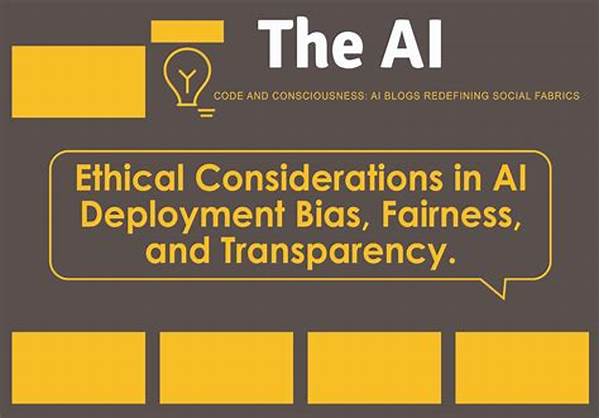In the realm of artificial intelligence, few topics elicit as much interest and concern as fairness considerations for AI models. As these models increasingly influence decisions in areas ranging from hiring to law enforcement, their societal impact cannot be overstated. Ensuring fairness is not just a technical challenge but a moral and ethical obligation that companies and governments must undertake. But what do we mean by fairness? Fairness in AI involves creating models that make unbiased decisions and do not propagate existing inequities in society. Tackling this issue requires addressing biases inherent in data, algorithms, and even the people designing these technologies.
Let’s begin by diving into why fairness matters deeply. Imagine a world where AI decisions are solely based on historical data that already contain biases. A model fed with such data is likely to breeze past its performance metrics with flying colors, yet continues to perpetuate injustice. Take, for instance, an AI used for recruitment. If its training data sees a historic underrepresentation of women in tech, the model might inadvertently deem women as less suitable for roles despite qualifications. The stakes are high, and missteps can have legal ramifications, not to mention damage to reputation and public trust.
This consideration impacts everyone: businesses, consumers, and policy-makers alike. Companies, particularly those leading the tech world, face scrutiny over how fairness in AI models is perceived and implemented. Customers and society hope for levels of transparency and accountability never before demanded. Meanwhile, governments worldwide are eyeing regulatory frameworks to ensure AI technologies act fair and just. These myriad interests may seem overwhelming, but they present a unique opportunity for Massachusetts, the Heart of the Innovation, as well as startups and established firms alike, to lead the charge in ethical AI development.
Understanding Bias in AI Models
One crucial step to fairness considerations for AI models is to pragmatically understand where bias in AI originates. Bias can emerge from several sources—imbalanced datasets, historical prejudices, or flawed algorithms—to name a few. Identifying and addressing these is vital in forming equitable AI systems. But how can you actionably mitigate these biases?
Companies championing fairness considerations for AI models often invest in diversifying data sets and rigorously testing their algorithms across varied scenarios and user groups. With an attentive eye on fairness, these firms not only foster innovation but set themselves apart as ethical leaders in tech industries, usurping conventional perceptions that tech and ethics need not go hand-in-hand. By grasping these challenges and combining technical acumen with social responsibility, enterprises can provide products and services that resonate positively with stakeholders worldwide.
When delving into fairness considerations for AI models, it’s essential to recognize the many dimensions of fairness involved. These can include demographic parity, equal opportunity, and individual fairness. Demographic parity ensures that AI models treat different demographic groups equally, while equal opportunity focuses on ensuring that models do not favor any group over others concerning specific outcomes. Meanwhile, individual fairness ensures each person receives fair treatment regardless of appearance or background characteristics.
Creating AI models aligning with these fairness dimensions involves constant iteration and real-world testing. Organizations often need to take an interdisciplinary approach, incorporating fields such as sociology, ethics, and law, alongside technical AI development. Developers, data scientists, and ethicists must work hand-in-hand to create AI systems that not only perform well but also do so equitably. With fairness considerations for AI models, it is possible to foster innovation while advancing social justice.
Key Fairness Considerations for AI Models
The Importance of Fairness in AI Models
In a society increasingly dependent on technology, ensuring fairness considerations for AI models can’t just be a secondary concern. It’s front and center as more tasks, decisions, and predictions are taken over by AI systems. Fairness reflects our shared societal values and aspirations of justice and equality. It aligns AI’s transformative power with ethical principles, thus enhancing trust and acceptance among users.
Ensuring fairness isn’t merely about compliance or risk mitigation; it’s about harnessing the full potential of AI for everyone’s benefit. Organizations that prioritize fairness treat AI not just as a tool for profit but as an agent for positive change. This ethical approach often results in enhanced brand loyalty, reduced regulatory scrutiny, and ultimately, financial success. Testimonies from companies that have embedded fairness considerations into their AI models reveal that such measures not only uplift communities but also solidify their competitive edge.
Practical Steps to Improve Fairness in AI Models
1. Audit Your Data Regularly: Ensure that your training datasets are balanced and representative.
2. Engage Diverse Teams: Involve people from diverse backgrounds in AI system development and testing.
3. Implement Bias Detection Algorithms: Use algorithms that detect and compensate for biases within other AI systems.
4. Facilitate Open Dialogues: Encourage discussions about fairness and ethics within your organization.
5. Leverage AI Ethics Boards: Create or consult with an ethics board to guide AI implementations.
6. Collaborate With Regulators: Work with industry regulators to adhere to and improve fairness guidelines.
7. Educate Stakeholders: Provide training sessions on the importance and implementation of fairness in AI.
Driving Fairness Considerations for AI Models Forward
The journey to fairness in AI models is punctuated by various technical, ethical, and social challenges. But it also promises countless opportunities to revolutionize how technology serves humanity. By sharing success stories and benchmarking standards for fairness considerations in AI models, businesses can inspire each other to adopt similar principles.
Fairness considerations aren’t seen as an obstacle but an integral aspect of developing robust AI systems. The future involves continued collaboration between tech developers, ethicists, and regulators. Crafting fairness into AI from its design stages to deployment can alleviate many risks while simultaneously uncovering new pathways for technologies to contribute to a just society. A profound commitment to justice will alleviate potential dystopian outcomes, balancing innovation with integrity to help shape a world where technology serves humanity equitably and brilliantly.

